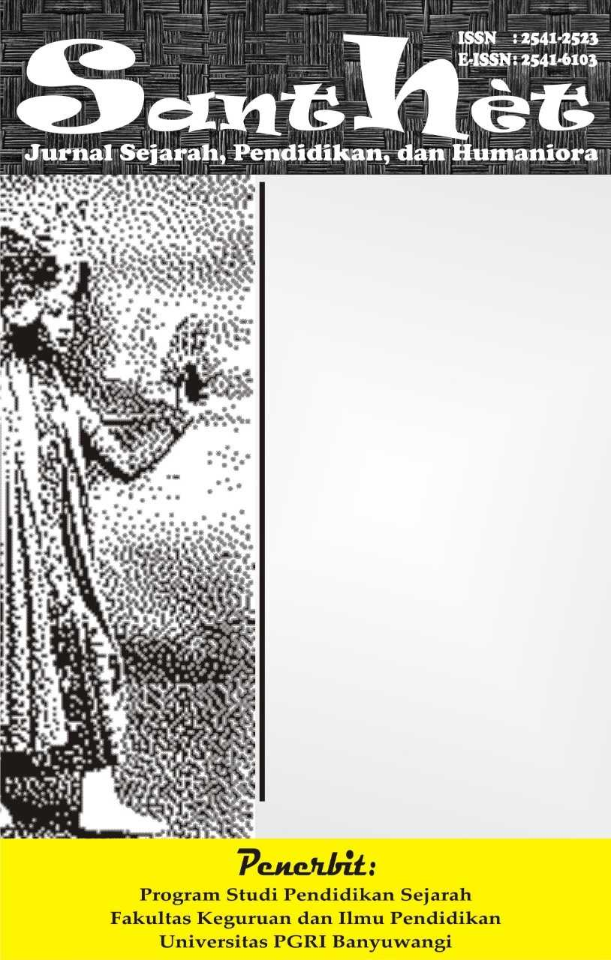THE ROLE OF MATERIALISM BETWEEN SOCIAL COMPARISON & IMPULSE BUYING
Peran Materialism Diantara Social Comparison & Impulse Buying
DOI:
https://doi.org/10.36526/santhet.v8i2.4740Keywords:
Social Comparison, Materialism, Impulse BuyingAbstract
Impulse buying occurs when various features such as flash sales, free shipping, and promotional notifications on Shopee often encourage consumers to make spontaneous purchases without careful consideration, thus potentially giving rise to consumptive behavior and waste.This study aims to analyze the effect of social comparison on impulsive buying with the mediating role of materialism. In this study, a sample of 220 was used which was then processed using the Smart PLS 3 application to test the hypothesis. The results showed that 1) social comparison had a positive and significant effect on Materialism, 2) social comparison did not have a positive and significant effect on Impulse Buying, 3) Materialism had a positive and significant effect on Impulse Buying, 4) social comparison had a positive and significant effect on Impulse Buying mediated by Materialism
References
Aversion, R., Behaviour, R., & Survey, A. (2003). Working Paper Series. Review, 85(6). https://doi.org/10.20955/r.85.67
Badgaiyan, A. J., & Verma, A. (2014). Journal of Retailing and Consumer Services Intrinsic factors affecting impulsive buying behaviour — Evidence from India. Journal of Retailing and Consumer Services, 21(4), 537–549. http://dx.doi.org/10.1016/j.jretconser.2014.04.003
Barakat, M. A. (2019). A Proposed Model for Factors Affecting Consumers ’ Impulsive Buying Tendency in Shopping Malls. Journal of Marketing Management, 7(1), 2333–6099. https://doi.org/10.15640/jmm.v7n1a10
Behavior, S., & Chan, K. (2014). Materialism and Social Comparison among Adolescents. March. https://doi.org/10.2224/sbp.2007.35.2.213
Chavosh, A., Halimi, a B., Namdar, J., Choshalyd, S. H., & Abbaspour, B. (2011). The contribution of Product and Consumer characteristics to Consumer’s Impulse purchasing Behaviour in Singapore. Social Science and Humanity, Pt One, 5(Icssh), 248–252.
Dawson, S. (2015). A Consumer Values Orientation for Materialism and Its Measurement : Scale Development and Validation. February 1992. https://doi.org/10.1086/209304
Febrilia, I., & Warokka, A. (2021). Consumer traits and situational factors: Exploring the consumer's online impulse buying in the pandemic time. Social Sciences & Humanities Open, 4(1), 100182.
Hu, Y. T., & Liu, Q. Q. (2020). Passive social network site use and adolescent materialism: Upward social comparison as a mediator. Social Behavior and Personality: an international journal, 48(1), 1-8.
Islam, T., Sheikh, Z., Hameed, Z., Khan, IU, Azam, RI, 2018. Perbandingan sosial, materialisme, dan pembelian kompulsif berdasarkan model stimulus-respons: studi perbandingan di kalangan remaja dan dewasa muda. Konsumen Muda. 19 (1), 19–37
Iyer, G. R., Blut, M., Xiao, S. H., & Grewal, D. (2020). Impulse buying : a meta-analytic review. 384–404.
Jones, M. A., Reynolds, K. E., Weun, S., & Beatty, S. E. (2003). The product-specific nature of impulse buying tendency. Journal of business research, 56(7), 505-511.
Kim, D. and S. Jang. 2017. “Symbolic consumption in upscale cafés: Examining Korean Gen Y consumers’ materialism, conformity, conspicuous tendencies, and functional qualities.” Journal of Hospitality and Tourism Research 41(2): 154–179. DOI:10.1177/1096348014525633. (Accessed 3 February 2022)
Liu, Q. Q., Zhou, Z. K., Yang, X. J., Niu, G. F., Tian, Y., & Fan, C. Y. (2017). Upward social comparison on social network sites and depressive symptoms: A moderated mediation model of self-esteem and optimism. Personality and Individual Differences, 113, 223-228.
Ling, Y., Gao, B., Jiang, B., Fu, C., & Zhang, J. (2023). Materialism and envy as mediators between upward social comparison on social network sites and online compulsive buying among college students. Frontiers in Psychology, 14(March), 1–8. https://doi.org/10.3389/fpsyg.2023.1085344
Öztürk, A., Sima, NART, 2016. Hubungan antara materialisme-minat pakaian fashion-pembelian tidak terencana: Sebuah penelitian pada mahasiswa. Ekonomi Internasional. Jurnal Penelitian. 2 (3), 45–55
Pembelian, K., Dengan, I., & Reaksi, D. (2017). PENGARUH HEDONIC SHOPPING VALUE DAN ATMOSFER GERAI TERHADAP KEPUTUSAN PEMBELIAN IMPULSIF DENGAN DIMEDIASI REAKSI IMPULSIF Trecya Gita Maya Kartika, Rofiaty, Fatchur Rohman. 4(2), 188–197.
Permatasari, I., Mukhsin, M., & Atiah, I. N. (2025). Pengaruh Flash Sale dan Free Shipping terhadap Impulsive Buying Behavior dalam Perspektif Ekonomi Islam. 2025.
Rook, D. W., & Fisher, R. J. (1995). Normative Influences on Impulsive Buying Behavior. Journal of Consumer Research, 22(3), 305. https://doi.org/10.1086/209452
Unanue, W., Rempel, K., Gómez, M. E., & Van den Broeck, A. (2017). When and why does materialism relate to employees’ attitudes and well-being: The mediational role of need satisfaction and need frustration. Frontiers in Psychology, 8(OCT), 1–15. https://doi.org/10.3389/fpsyg.2017.01755
Wang, J. L., Wang, H. Z., Gaskin, J., & Hawk, S. (2017). The mediating roles of upward social comparison and self-esteem and the moderating role of social comparison orientation in the association between social networking site usage and subjective well-being. Frontiers in Psychology, 8(MAY), 1–9. https://doi.org/10.3389/fpsyg.2017.00771





























